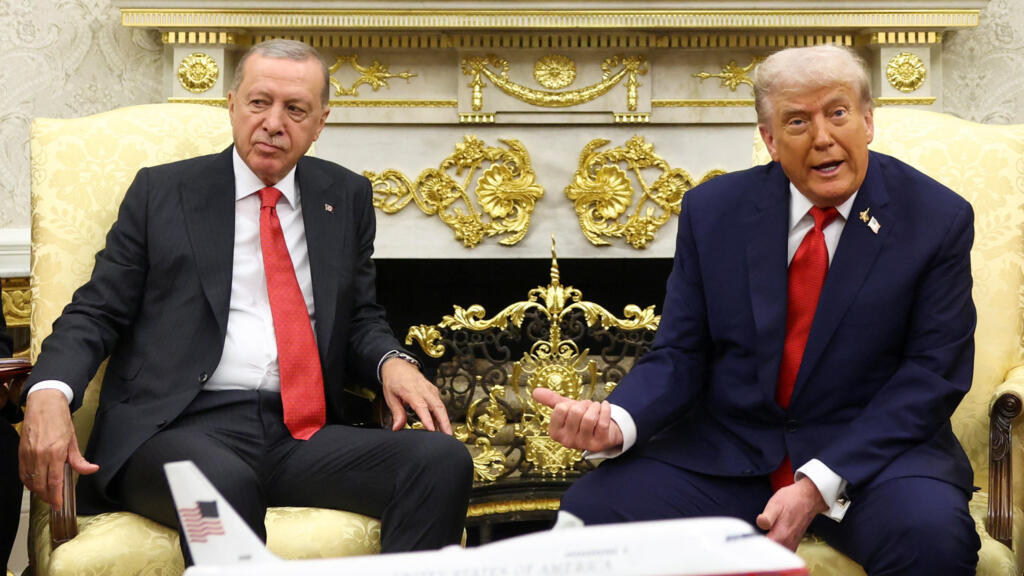Trump tests Turkey's energy dependence on Russia with lure of US power
Issued on:
President Recep Tayyip Erdogan is facing growing pressure from Washington to cut Turkey’s heavy dependence on Russian oil and gas – and end his long-standing balancing act between Moscow and the West.

Erdogan said this week that Turkey would work with the United States on civil nuclear energy, in a new signal to Washington that Ankara is looking west for its energy needs.
Turkish companies last month signed a 20-year, multibillion-dollar deal with American firms to buy liquefied natural gas.
The agreement came during Erdogan’s visit to Washington to meet US President Donald Trump in late September. During that meeting, Trump urged Erdogan to reduce ties with Moscow and end Turkey’s reliance on Russian oil and gas.
“In a sense, he [Trump] is offering a grand bargain to Erdogan,” said Asli Aydintasbas of the Washington-based Brookings Institution.
She summed up the deal: “Stop the hedging, stop the stuff with Russia, stop the geopolitical balancing, and then let’s re-establish the partnership, and then we can move along and can really become key partners in the region.”
Turkey walks a tightrope as Trump threatens sanctions over Russian trade
Economic pressure
Trump often praises Erdogan as a “friend”, but the US leader has shown he is willing to use economic pressure. During his first term, he triggered a collapse in the Turkish lira over the jailing of an American pastor.
He could again target Ankara with secondary sanctions if Turkey keeps importing Russian energy.
Russian fossil fuels still provide nearly half of Turkey’s total energy. Zaur Gasimov, a Russian-Turkish expert with the German Academic Exchange Service, said Europe’s experience shows how costly a sudden break with Moscow could be.
“It was the case with some Western European countries in 2022 that caused an augmentation of the prices,” said Gasimov. “And the Turkish economy is struggling with inflation that would immediately and heavily affect the life of the average citizen. No party power in Turkey would take such a decision.”
Ankara has ruled out ending its Russian energy contracts, but oil imports from Russia have fallen to their lowest levels in a year.
Some gas deals, signed decades ago, are due for renewal. Analysts say Turkey may use that moment to slowly cut its dependence on Moscow – a move that would deal a serious blow to Russia, which now relies on Turkey as its last major European gas customer.
Druzhba pipeline: dependence, diplomacy and the end of Russian leverage in Europe
Strategic balancing
Energy trade has long been at the heart of Erdogan’s personal relationship with Russian President Vladimir Putin. The partnership has survived the war in Ukraine, despite the fact Turkey also supplies arms and support to Kyiv.
Turkey’s balancing act helps keep regional rivalries under control, said Ozgur Unluhisarcikli, who heads the Marshall Fund office in Ankara.
“Turkey and Russia have been fighting proxy wars in the Caucasus, in North Africa, in the Levant,” he said. “Turkey is getting the upper hand in the end. But Turkey could still manage its relationship with Russia.”
Unluhisarcikli added that Ankara would want guarantees from the West before distancing itself from Moscow, since "it would have security implications on Turkey".
Turkey would have to be "certain" that it would be welcomed back to Europe and have assurances from the United States, he suggested.
Erdogan spoke with Putin by phone this week, though such contacts have reportedly become less frequent as their once-close relationship cools.
Ankara remains aware of the risks: when Turkey accidentally shot down a Russian bomber near the Syrian border in 2015, Putin responded with sanctions that hit Turkish exports and tourism, and several Turkish soldiers in Syria were later killed in what Moscow called an accident.
Turkey eyes Ukraine peacekeeping role but mistrust clouds Western ties
Declining leverage
With Russia weakened by sanctions and isolation over its war in Ukraine, analysts say its influence on Turkey is diminishing.
“It is the window to Europe. It is a way to the outside world," Gasimov says. "The number of flights to Turkey is getting bigger and bigger.
“For Russia, Turkey remains a very, very important partnership. So the leverage Moscow once possessed over Ankara is getting less and less.”
Daily newsletterReceive essential international news every morning
Subscribe